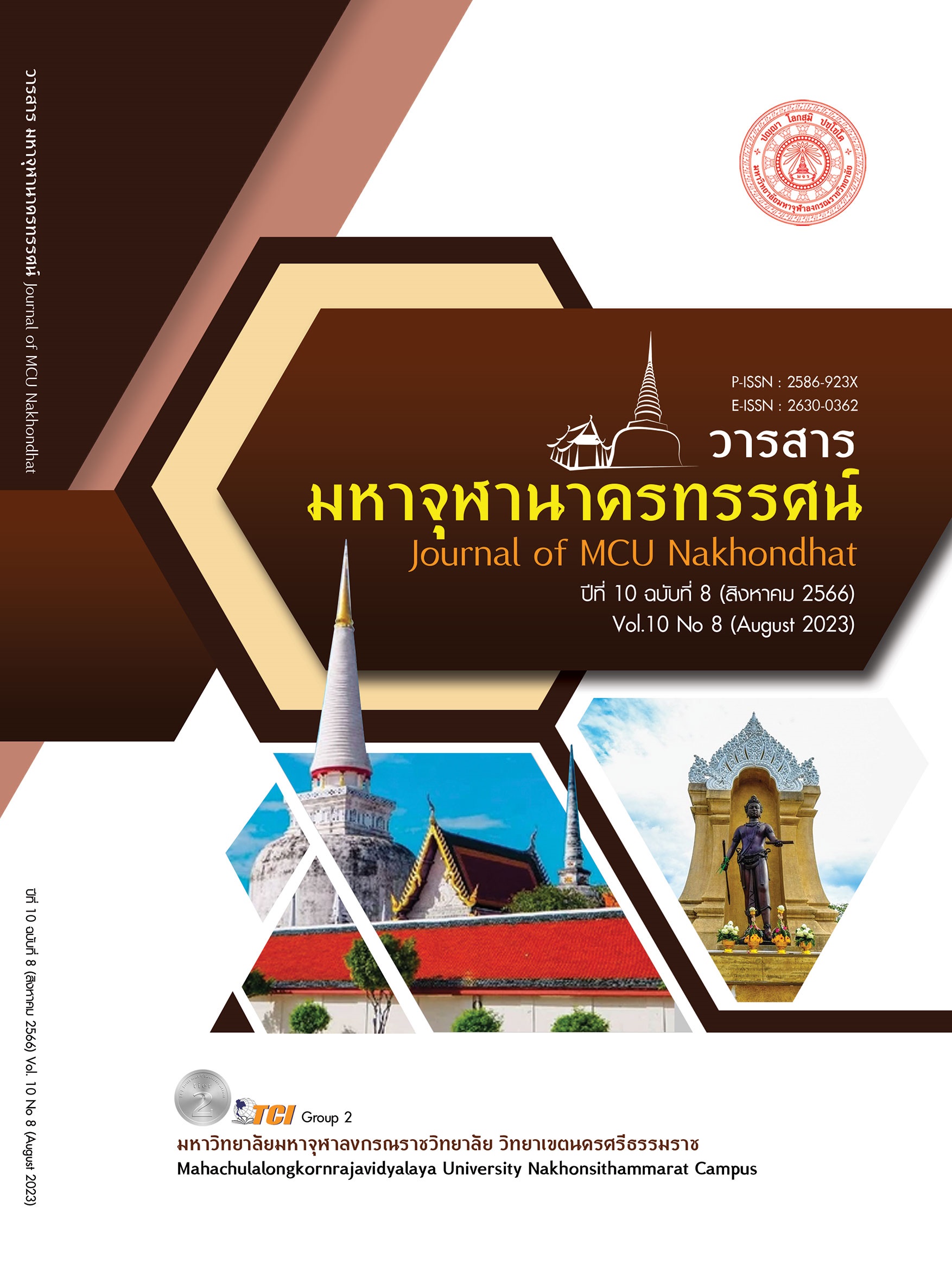AN APPLICATION OF BHAVANA PRINCIPLE TO ENHANCE THE WELL-BEING OF THE ELDERLY OF TROKPLA COMMUNITY, MUEANG TRANG DISTRICT, TRANG PROVINCE
Main Article Content
Abstract
The objectives of this research article were to 1) to study the concept of enhancing the well-being of the elderly; 2) to investigate the Bhavana principle in the Theravada Buddhist scriptures, and 3) to apply the principles of Bhavana to enhance the well-being of the elderly. It is qualitative research focusing on documents and in-depth interviews. Findings were as follows: In the research, it was found that: 1) Concept of Enhancing Elderly well-being is the process of achieving physical and mental integrity with physical aspects consisting of physical strength, social aspects consisting of good interaction with others. Pertaining to mental, there is simple happiness and for wisdom, there is concept to perceive human beings with understanding to harmoniously live with awareness according to reality. 2) The Bhavana principle in Theravada Buddhist scriptures is a principle that develops oneself to be prosperous both physically and mentally. There are four aspects: 2.1) Kaya-bhavana: physical development known to consume four factors, 2.2) Sila bhavana: behavior development moral development to live in society, 2.3) Citta-bhavana: cultivation of the heart to accommodate the emotions and flourish with virtue, 2.4) Panna-bhavana: solve problems with wisdom cultivation of wisdom of elders’ life with a process of deliberation all things as they really are. 3) The application of Bhavana principle to enhance elders’ well-being of Trokpla community, Muang Trang district is used in the four aspects: 3.1) Kaya-bhavana: making elders physically strong, 3.2) Sila bhavana: promoting elders in building relationship with family, community and society, 3.3) Citta-bhavana: enhancing elders with positive attitude and morality, 3.4) Panna-bhavana: promoting elders with life understanding and thinking process with awareness according to reality.
Article Details

This work is licensed under a Creative Commons Attribution-NonCommercial-NoDerivatives 4.0 International License.
References
กุลวิดี โรจน์ไพศาลกิจ และคณะ. (2560). การพัฒนาแนวทางการดำเนินงานของชุมชนในการพัฒนาสุขภาวะผู้สูงอายุ. วารสารสมาคมนักวิจัย, 22(1), 81-97.
จิรวรรณ โปรดบำรุง. (2559). การดูแลผู้สูงอายุตามหลักพุทธจริยศาสตร์. วารสารมหาวิทยาลัยมหาจุฬาลงกรณราชวิทยาลัย วิทยาเขตขอนแก่น, 33(2). 233-240.
ธนพร สิงห์นวล. (2564). ลำดวนส่งกลิ่นหอมเย็นในวันผู้สูงอายุ. เรียกใช้เมื่อ 1 พฤศจิกายน 2564 จาก http://www.culture.go.th/culture_th/mobile_detail.php?cid=11&nid=556
ประเวศ วะสี. (2549). การพัฒนาระบบสุขภาพชุมชน สุขภาวะชุมชนเป็นรากฐานของสุขภาวะทั้งมวล. กรุงเทพมหานคร: สำนักงานหลักประกันสุขภาพแห่งชาติ.
พระกองสี ญาณธโร. (2560). ศึกษาวิเคราะห์การดำเนินชีวิตตามหลักภาวนา 4 ในพระพุทธศาสนา. ใน วิทยานิพนธ์พุทธศาสตรมหาบัณฑิต สาขาวิชาพระพุทธศาสนา. มหาวิทยาลัยจุฬาลงกรณราชวิทยาลัย.
พระพรหมคุณาภรณ์ (ป.อ. ปยุตฺโต). (2545). พจนานุกรมพุทธศาสตร์ ฉบับประมวลธรรม. (พิมพ์ครั้งที่ 10). กรุงเทพมหานคร: บริษัทสหธรรมิก จำกัด.
พระไพศาล วิสาโล. (2561). สุขภาวะทางปัญญาที่เราควรรู้จัก ใน สุขภาพคนไทย 2561พุทธศาสนากับการสร้างเสริมสุขภาวะ. (หน้า 101-102). นครปฐม: สถาบันวิจัยประชากรและสังคมหาวิทยาลัยมหิดล.
พระมหาเชาวฤทธิ์ ทรัพย์สวัสดิ์ นรินฺโท. (2562). การศึกษาแนวทางการพัฒนาคุณภาพชีวิตผู้สูงอายุตามหลักภาวนา 4 กรณีศึกษา: ผู้สูงอายุบ้านห้วยหอย ตำบลธาตุทอง อำเภอภูเขียว จังหวัดชัยภูมิ. ใน นิพนธ์พุทธศาสตรดุษฎีบัณฑิต สาขาวิชาพระพุทธศาสนา. มหาวิทยาลัยมหาจุฬาลงกรณราชวิทยาลัย.
มิเตอร์ประเทศไทย. (2564). ประชากรสูงอายุ. เรียกใช้เมื่อ 1 พฤศจิกายน 2564 จาก http://www.thailandometers.mahidol.ac.th/#elderly
ลัดดาวัลย์ ไวยสุระสิงห์และสุภาภรณ์ วรอรุณ. (2560). กระบวนการพยาบาลชุมชน: แนวคิดทฤษฎีและการประยุกต์ใช้ดูแลสุขภาพประชาชน. (พิมพ์ครั้งที่ 1). กรุงเทพมหานคร: จุฬาลงกรณ์มหาวิทยาลัย.
วรัญญู รีรมย์. (2559). พฤติกรรมสุขภาพและความต้องการสร้างเสริมสุขภาวะองค์รวมของผู้สูงอายุจังหวัดแพร่. ใน รายงานการวิจัย. เชียงใหม่: มหาวิทยาลัยแม่โจ้.
สัมพันธ์ เตชะอธิก และคณะ. (2555). การพัฒนาสุขภาวะเพื่อความอยู่ดีมีสุข. ใน รายงานการวิจัย. ขอนแก่น: มหาวิทยาลัยขอนแก่น.


